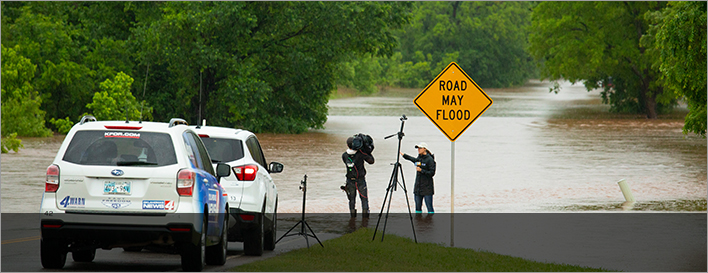Dr. Joseph Ripberger


Dr. Joseph Ripberger is an assistant professor of political science and deputy director for research at the Center for Risk and Crisis Management at the University of Oklahoma. He is a member of the OK NSF EPSCoR Track-1 RII Award titled Socially Sustainable Solutions for Water, Carbon, and Infrastructure Resilience in Oklahoma. The $20 million research project is a social science-led, multi-disciplinary collaboration among social, physical, biological, engineering, and computational scientists. More than thirty researchers from across the state are working together on the project, which began July 1, 2020.
Currently, Dr. Ripberger's research focuses on risk and public policy with an emphasis on weather, climate, and water policy. His interests include climate variability and human adaptation in Oklahoma, social responses to changes in complex river systems, and a systematic assessment of the watch, warning, and advisory system in the United States.
Dr. Ripberger's research supports the Social Dynamics Research Framework aspect of the OK NSF EPSCoR project. Human perceptions and beliefs are at the heart of the most critical challenges facing Oklahoma. They shape behaviors and collective decisions, and therefore our responses to the changing world. Using data from the M-SISNet, the social dynamics team will (a) measure and model perceptions and beliefs underpinning the social narratives that shape debates among the public, opinion leaders, and scientists about the emerging, interconnected, and salient threats to Oklahomans identified in our research focus areas; (b) evaluate how widely shared narratives have undermined collective action to pursue convergent solutions to wicked problems that recognize and address the array of anthropogenic drivers of these threats; and (c) measure social valuation for solutions using willingness-to-pay for potential sustainable solutions.
Coupled with the project’s four interconnected focus areas, the Social Dynamics framework provides the structure and direction of the EPSCoR project. The distinct but interrelated focus areas and the research questions they pursue were selected because they deepen understanding of overlapping natural and human dynamics that drive critical problems facing Oklahoma today. Treated individually as stand-alone problems, they are susceptible to social polarization and policy gridlock. Addressed as an integrated set, these dynamics offer the prospect for revised understandings of problem boundaries and provide the potential for informed value tradeoffs across social groups that can enable socially sustainable solutions to address our most pressing problems.
- Jones, B. A., Berrens, R. P., Jenkins-Smith, H., Silva, C., Ripberger, J., & Carlson, D. 2019. Inclusive Non-market Valuation in Coupled Human and Natural Systems (CHANS): A Motivating Theory. Journal of Environmental Economics and Policy. 8(1):1-16.
- Gupta, K., Ripberger, J., & Wehde, W. 2018. Advocacy Group Messaging on Social Media: Using the Narrative Policy Framework to Study Twitter Messages about Nuclear Energy Policy in the United States. Policy Studies Journal. 46(1):119-136.
- Jones, B. A., Berrens, R. P., Jenkins-Smith, H., Silva, C., Ripberger, J., Carlson, D…& Wehde, W. 2018. In: Search of an Inclusive Approach: Measuring Non-market Values for the Effects of Complex Dam, Hydroelectric and River System Operations. Energy Economics. 69:225-236.
- Ripberger, J. T., Jenkins‐Smith, H. C., Silva, C. L., Czajkowski, J., Kunreuther, H., & Simmons, K. M. 2018. Tornado Damage Mitigation: Homeowner Support for Enhanced Building Codes in Oklahoma. Risk analysis. 38 (11):2300-2317.
- Ripberger, J. T., Jenkins-Smith, H. C., Silva, C. L., Carlson, D. E., Gupta, K., Carlson, N., & Dunlap, R. E. 2017. Bayesian versus Politically Motivated Reasoning in Human Perception of Climate Anomalies. Environmental Research Letters. 12 (11):114004.
- Jenkins-Smith, H., Ripberger, J., Silva, C., Carlson, N., Gupta, K., Henderson, M., & Goodin, A. 2017. The Oklahoma Meso-scale Integrated Socio-geographic Network: A Technical Overview. Journal of Atmospheric and Oceanic Technology. 34(11):2431-2441.
- Jones, B. A., Ripberger, J., Jenkins-Smith, H., & Silva, C. 2017. Estimating Willingness to Pay for Greenhouse Gas Emission Reductions Provided by Hydropower Using the Contingent Valuation Method. Energy Policy. 111:362-370.
- Jones, B. A., Berrens, R. P., Jenkins-Smith, H. C., Silva, C. L., Carlson, D. E., Ripberger, J. T., Gupta, K. & Carlson, N. 2016. Valuation in the Anthropocene: Exploring Options for Alternative Operations of the Glen Canyon Dam. Water Resources and Economics. 14:13-30.
- Ripberger, J. T., Silva, C. L., Jenkins‐Smith, H. C., Carlson, D. E., James, M., & Herron, K. G. 2015. False Alarms and Missed Events: The Impact and Origins of Perceived Inaccuracy in Tornado Warning Systems. Risk analysis. 35(1):44-56.
- Gupta, K., Ripberger, J. T., & Collins, S. 2014. The Strategic Use of Policy Narratives: Jaitapur and the Politics of Siting a Nuclear Power Plant in India. In: The Science of Stories. Palgrave Macmillan, New York. pp. 89-106.
